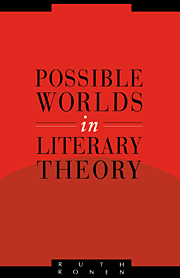Book contents
- Frontmatter
- Contents
- Acknowledgments
- Introduction
- 1 Possible worlds, fictional worlds
- 2 The possibility of fictional worlds
- 3 The Fictionality of fictional worlds
- 4 Fictional entities, incomplete beings
- 5 Fictional events and the intricacies of plot
- 6 Focalization and fictional perspective
- 7 Fictional time
- Conclusion
- Bibliography
- Index
3 - The Fictionality of fictional worlds
Published online by Cambridge University Press: 12 November 2009
- Frontmatter
- Contents
- Acknowledgments
- Introduction
- 1 Possible worlds, fictional worlds
- 2 The possibility of fictional worlds
- 3 The Fictionality of fictional worlds
- 4 Fictional entities, incomplete beings
- 5 Fictional events and the intricacies of plot
- 6 Focalization and fictional perspective
- 7 Fictional time
- Conclusion
- Bibliography
- Index
Summary
Why is there a problem in defining fictionality?
Our world consists of a variety of world versions: worlds of physicists, worlds of common sense, ideological worlds, historical versions of the world and others. Included in this plurality of kinds of worlds is the class of fictional worlds which, not unlike world-classes of other ontological status, is both diffuse and constantly changing. In view of the history of culture, one could say that worlds projected by literary texts possess no absolute properties indicating their fictionality, and that fictionality cannot be identified either with cross-cultural or with meta-historical criteria. Texts originally written as history or as philosophy can be “fictionalized” (that is, converted into fiction) at a later point in cultural history; fictionality and actuality can be relativized to a cultural perspective (legends about Greek gods were presumably treated as versions of reality by people in ancient Greece). Moreover, it is not that fictional texts necessarily refer to imaginary beings: many fictions rely heavily on references to objects and events belonging to actual history. Fictional worlds hence constitute one set of world versions, which are delimited from other world versions according to time-specific or culture-specific determinations.
Apart from the fact that fictionality cannot be regarded as a stable property of texts and that the boundaries between fictional worlds and other world models in a culture can fluctuate, there is also a difficulty in trying to delineate any class of fictional texts produced and received as such in a given cultural context, because fictional aspects might also appear in texts claiming to be history, journalism or science.
- Type
- Chapter
- Information
- Possible Worlds in Literary Theory , pp. 76 - 107Publisher: Cambridge University PressPrint publication year: 1994



